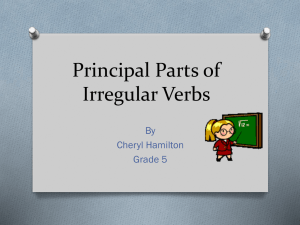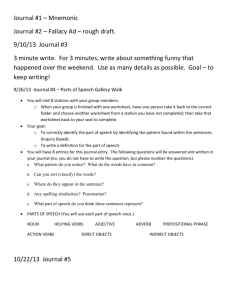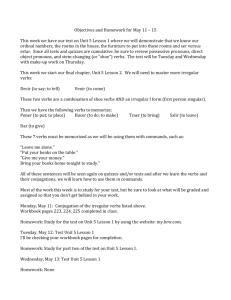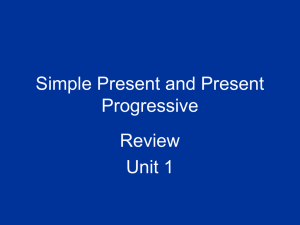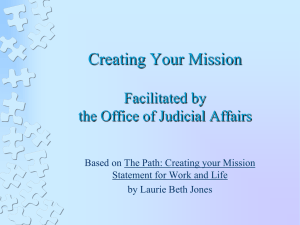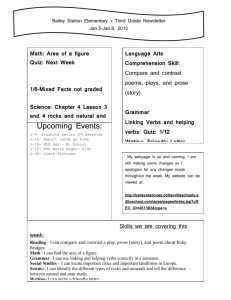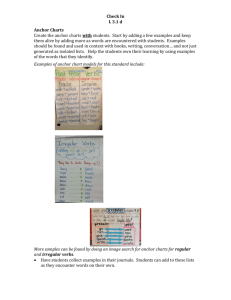L2.1d Resources
advertisement
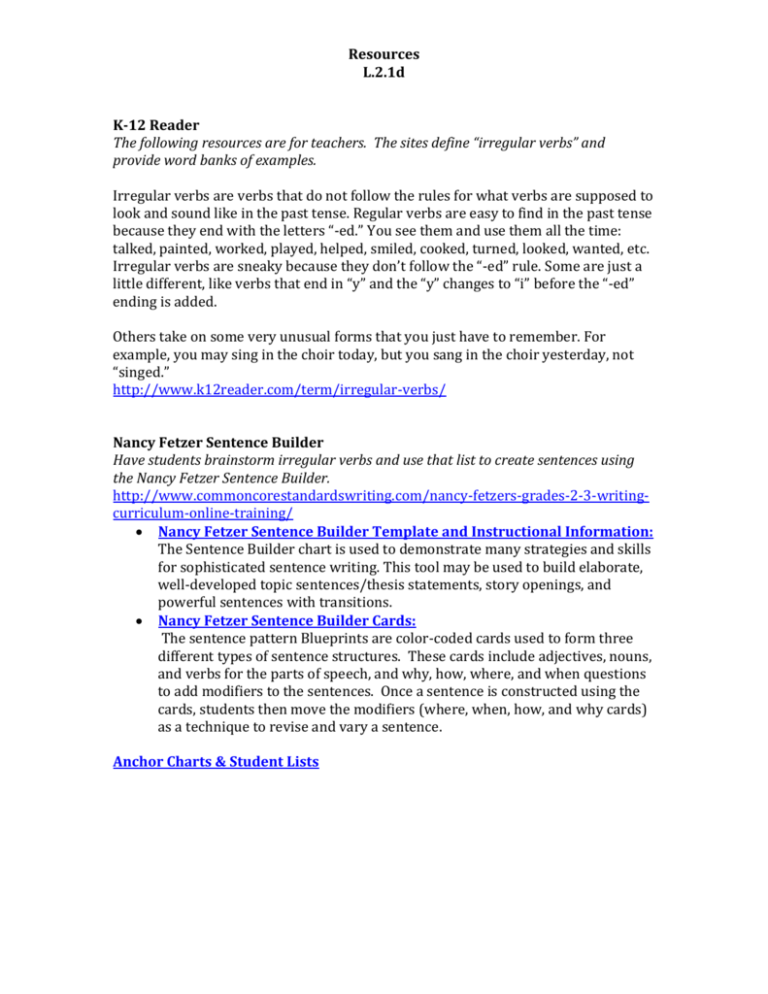
Resources L.2.1d K-12 Reader The following resources are for teachers. The sites define “irregular verbs” and provide word banks of examples. Irregular verbs are verbs that do not follow the rules for what verbs are supposed to look and sound like in the past tense. Regular verbs are easy to find in the past tense because they end with the letters “-ed.” You see them and use them all the time: talked, painted, worked, played, helped, smiled, cooked, turned, looked, wanted, etc. Irregular verbs are sneaky because they don’t follow the “-ed” rule. Some are just a little different, like verbs that end in “y” and the “y” changes to “i” before the “-ed” ending is added. Others take on some very unusual forms that you just have to remember. For example, you may sing in the choir today, but you sang in the choir yesterday, not “singed.” http://www.k12reader.com/term/irregular-verbs/ Nancy Fetzer Sentence Builder Have students brainstorm irregular verbs and use that list to create sentences using the Nancy Fetzer Sentence Builder. http://www.commoncorestandardswriting.com/nancy-fetzers-grades-2-3-writingcurriculum-online-training/ Nancy Fetzer Sentence Builder Template and Instructional Information: The Sentence Builder chart is used to demonstrate many strategies and skills for sophisticated sentence writing. This tool may be used to build elaborate, well-developed topic sentences/thesis statements, story openings, and powerful sentences with transitions. Nancy Fetzer Sentence Builder Cards: The sentence pattern Blueprints are color-coded cards used to form three different types of sentence structures. These cards include adjectives, nouns, and verbs for the parts of speech, and why, how, where, and when questions to add modifiers to the sentences. Once a sentence is constructed using the cards, students then move the modifiers (where, when, how, and why cards) as a technique to revise and vary a sentence. Anchor Charts & Student Lists Resources L.2.1d Teachers create an “Irregular Verbs” anchor chart with their students. Students create “Irregular Verb” lists in their journals. Students can then add words to the chart or their own “Irregular Verbs” lists in their journals. The words can be collected from books they are reading, word walls, and other print throughout the room, etc. What Did You Do This Summer? Paula wrote an essay about what she did this summer. But she wrote it in present tense and it should be in past tense. Students will help her by rewriting the paragraph in the past tense. (Use “worksheets” cautiously. You might use the worksheet as a model, in a collaborative group where students only have one worksheet and have to discuss the answers, or you might display the worksheet on the board and use 1-2 questions as an exit ticket or journal response where they answer the question and explain/justify their answers.) Regular and Irregular Verbs: This worksheet provides definitions/explanations of irregular past tense verbs. (Use “worksheets” cautiously. You might use the worksheet as a model, in a collaborative group where students only have one worksheet and have to discuss the answers, or you might display the worksheet on the board and use 1-2 questions as an exit ticket or journal response where they answer the question and explain/justify their answers.) Nancy Fetzer Narrative Writing Strategies: Teachers may use their Fetzer manual or the online link as a resource for planning the writing process. The link contains demonstration videos and blackline masters. Click on the link and scroll to the Narrative Section. http://www.commoncorestandardswriting.com/nancy-fetzers-grades-2-3-writingcurriculum-online-training/ Nancy Fetzer Training Modules are also available on LCPS Blackboard Resources L.2.1d CCSS Appendix C 2nd Grade Writing Sample and Annotation: This page and link will provide an exemplar of grade level narrative writing (page 17), including an explanation (annotation). An exemplar of opinion writing is on page 15. http://www.corestandards.org/assets/Appendix_C.pdf Florida Center for Reading Research (fcrr): Sentence Meaning: Build a Sentence Teachers can create their own cards with “irregular verbs” and utilize the following activity for instruction and practice. http://www.fcrr.org/studentactivities/c_005a.pdf Jan Richardson: Next Step in Guided Reading (Guided Writing Resources) Provide students with opportunities to write sentences using “irregular verbs” during guided writing. Reading Street Resources: Look for activities and information specific to “collective nouns”. Day 2: Vocabulary Activities (from digital path) Day 3: Grammar Jammers (from digital path)
